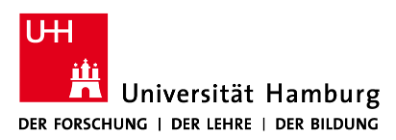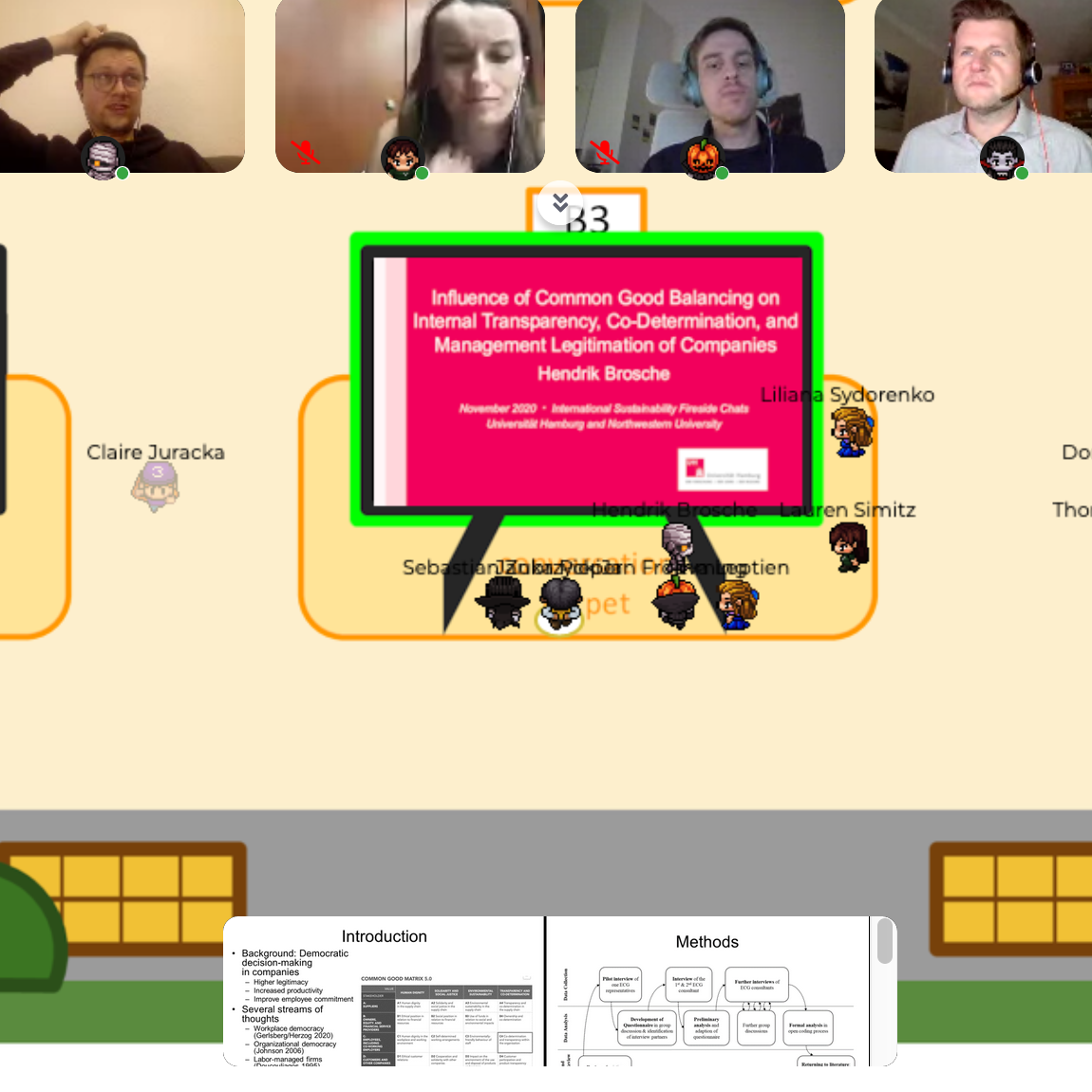Northwestern and Universität Hamburg partner for first-of-its-kind virtual poster session on sustainability
Northwestern and Universität Hamburg partner for first-of-its-kind virtual poster session on sustainability
Northwestern University and Universität Hamburg have intensified and deepened their collaborations and corporations over the last few years. This year, we had to learn a difficult lesson as far as international traveling and exchange programs are concerned and it’s only one of the reasons why such a format is highly appreciated to overcome the current hurdles.”
Ingenuin Gasser
Vice Dean for Internationalization, Universität Hamburg
An international exchange of ideas on sustainability was on the agenda for two virtual poster sessions jointly organized by Universität Hamburg in Germany and Northwestern University.
Two dozen undergraduate, graduate and doctoral students presented their research and attended fellow student presentations during virtual “fireside chat” poster sessions held on November 10th and November 17th, 2020.
Normally, Northwestern’s annual Global Engineering Trek on Sustainability to Germany brings a dozen rising sophomores to Universität Hamburg in September, but the COVID-19 pandemic forced a cancellation, leading the two institutions to devise an alternative way to help students make lasting academic connections and expand their international network during a time when travel and in-person academic exchanges are not an option.
Climate change and its disruptive impacts are global problems that require global, collaborative solutions,” said Mike McMahon, Senior Communications Manager at the Institute for Sustainability and Energy at Northwestern (ISEN), which co-organizes the Global Engineering Treks and was also co-host of the virtual poster sessions, together with Northwestern Engineering's Office of Global Initiatives and Northwestern's Office of International Relations.
“Events like these are absolutely essential. They create a forum for sharing research, motivate students to explore innovative solutions to pressing environmental challenges and create connections between prominent institutions that can only strengthen efforts to build a more sustainable world,” McMahon added.
The outcome was a virtual combination of the traditional fireside chat and research poster fair, hosted by the Northwestern startup company VirtualChair. The new, highly interactive format allowed students from both institutions to meet virtually and engage in scientific discussion across borders, providing them with international perspectives on their research and an intercultural experience.
Engineering Meets Social Sciences
Universität Hamburg’s broader focus on the social sciences coupled with Northwestern’s concentration on engineering and technology, and a shared interest in policy adaptation, offered a multi-disciplinary approach to the field.
“Problems of climate change and sustainability cannot be addressed in any one field. It must be interdisciplinary,” said Matthew Grayson, Professor of Electrical Engineering and Director of Global Initiatives at the McCormick School of Engineering in his welcome remarks. “There needs to be policy, there needs to be government action, there needs to be science, and there needs to be technology to understand the big picture.”
For example, a team of five students from Northwestern’s Master of Science in Energy and Sustainability (MSES) shared their deployment strategy for an equitable electric vehicle charging infrastructure for the city of Chicago that targets historically underdeveloped neighborhoods. The students previously presented their proposal to the City of Chicago’s Department of Transportation, which has decided to integrate many of the team’s recommendations into its official electric vehicle deployment strategy.
Similarly, Anastasia Montgomery, a third-year PhD candidate in the Department of Earth and Planetary Sciences at Northwestern, presented her research on how the electrification of municipal vehicles, such as school buses and refuse trucks, would lead to cleaner air in Chicago.
Climate change issues surfaced in nearly every presentation. Antje Katzschner, a PhD student representing Universität Hamburg shared strategies for adaptation to heat stress for cities in the context of climate change.
Thomas Massion, an undergraduate engineering student from Northwestern discussed the need for governments to think more critically about large-scale home reconstruction faced by an increase in natural disasters, which as he explained, are “expected to continue as a result of climate change.”
Jan Steinhauser, a master’s student from Hamburg, shared his work on a bottom-up global agricultural policy framework called FABLE, which is used to analyze German transformation strategies as compared to national and global climate and sustainability goals.
Eva Leptien from Hamburg discussed a training tool called “YouCOP” designed to more effectively teach climate change negotiation skills that can be used at major international conferences. “It's basically a simulation of a conference, where participants engage in a roleplay and try to create their own climate agreement with any obstacles that may come up during the process,” Leptien said.
To continue scientific discussions and explore possibilities for future collaborations between student presenters from the two institutions, a couple follow-up gatherings in a specially designed Northwestern University – Universität Hamburg virtual student lounge will take place this and next week.
Northwestern and Universität Hamburg
Northwestern and Universität Hamburg have had a formal partnership for several years. “Northwestern University and Universität Hamburg have intensified and deepened their collaborations and corporations over the last few years,” said Ingenuin Gasser, Vice Dean for Internationalization and Support for Young Researchers and Professor in the Department of Mathematics at Universität Hamburg. “This year, we had to learn a difficult lesson as far as international traveling and exchange programs are concerned and it’s only one of the reasons why such a format is highly appreciated to overcome the current hurdles.”
VirtualChair
The virtual platform used for the poster sessions, VirtualChair, replicated the traditional, familiar in-person poster fair atmosphere, yet in a completely new format. Founded by Jason Hartline, Professor of Computer Science at Northwestern University, VirtualChar is a virtual conference planning company whose platform resembles physical conference formats with options for interactive and spontaneous one-on-one networking and direct engagement with presenters and attendees.
“The platform was a big hit among students and guests,” said Jennifer Gerrard, Director of International Agreements and Visitors in the Office of International Relations. “We are currently looking at how we can use it with other international partners abroad to continue virtual collaborations and academic exchange beyond the pandemic. It has great potential.”
Presentation Titles
- A Critical Review of the Sustainability Reporting at the Universities: What are the motivations and barriers of universities to disclose voluntarily sustainability information? (Hamburg)
- Adaptation to heat stress in the context of urban planning (Hamburg)
- Analyzing German transformation pathways' alignment with national and global climate and sustainability goals in the FABLE framework (Hamburg)
- Influence of Common Good Balancing on Internal Transparency, Co-Determination, and Management Legitimation of Companies (Hamburg)
- Cleaner Chicago Air through Municipal Vehicle Fleet Electrification (Northwestern)
- Data-driven numerics for the identification of optimal electrocatalytic environment (Northwestern)
- Electric Vehicle DCFC Model in Chicago (Northwestern)
- Life-cycle impacts of additive manufacturing: From mine to factory gate (Northwestern)
- Machine Learning to Detect Natural Lands in High-Resolution Aerial imagery (Northwestern)
- Probing the electrochemical double layer using a combined experimental and computational approach (Northwestern)
- Rheological Characterization of Oxidized Carbon Black Suspensions in Aqueous Salt Solutions for Use in Flowable Capacitive Deionization Electrodes (Northwestern)
- Starting from zero: accelerating electric vehicle adoption in Chattanooga, Tennessee (Northwestern)
- YouCOP - Negotiating Sustainability in International Politics (Hamburg)

